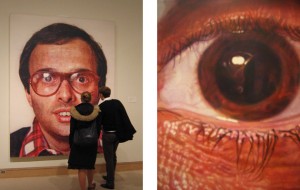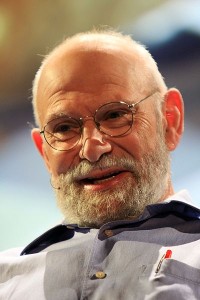A Chuck Close interview from 1978, a decade before a spinal artery collapse left him severely paralyzed but no less brilliant an artist. I went to the press event when he had his major retrospective at MoMA some years back and came away as impressed with him as his work, which is amazing. I believe I referred to his portraiture as “pointillism for the computer age” in a subsequent article, but it’s much more complex than that description.
Chuck Close describing his arrival in NYC in 1967, to New York magazine: “I paid $150 a month for a raw loft on Greene Street, and all my friends who were already living here laughed, thinking it was outrageous to pay that much. The loft had no heat. I painted for an entire year with gloves on and just my trigger finger sticking out to the button on the airbrush. Literally, the coffee would freeze in its mug; the toilet would freeze overnight. We slept under a pile of blankets.
Soho was rats and rags and garbage trucks: There were occasional wars between one Mafia-owned waste-management company and another, during which one would burn the other’s trucks. There might have been twenty artists—or people of any kind—living between Houston and Canal; you could have shot a cannon down Greene Street and never hit anybody. But we all lived within a few blocks of each other: Brice Marden, Richard Serra, Nancy Graves, Phil Glass. We were in someone’s loft every night, either listening to a composer like Steve Reich or watching dancers like Yvonne Rainer and Trisha Brown. A lot of us helped Richard make his lead prop pieces, because he needed muscle and brawn to roll the lead and stack it up. Phil was his only paid assistant, and the rest of us were this interesting group of writers, filmmakers, even Spalding Gray. After work we’d go over to this cafeteria in what is now the Odeon, and we’d sit around and dream up ideas on the back of napkins.”


